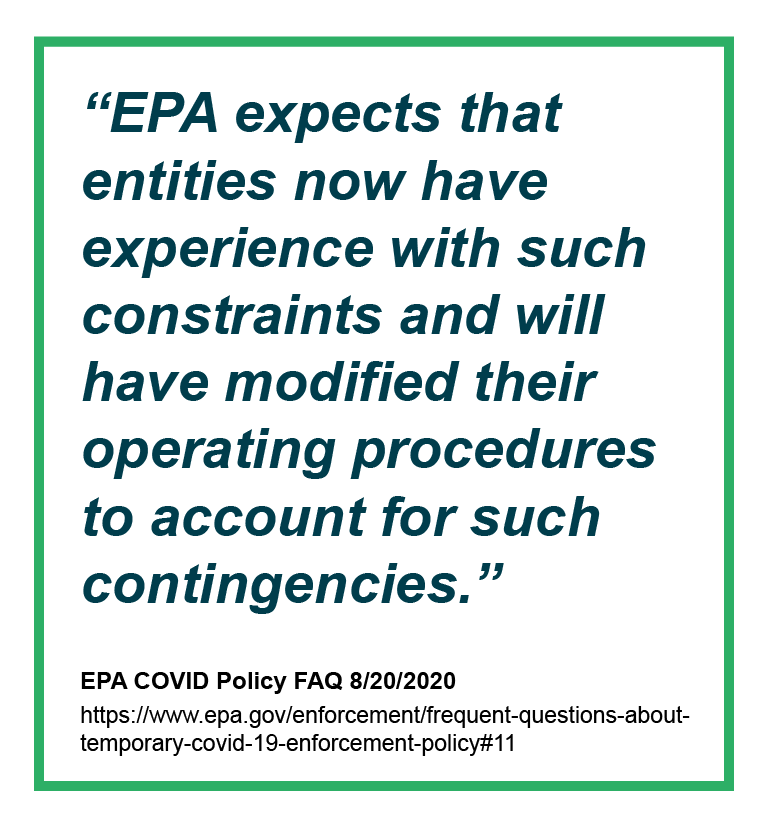 The upcoming environmental reporting season includes major obligations for most programs. With business as usual disrupted for the past couple of months, it is important to prepare the necessary information in order to submit accurate reports despite furloughs and temporary closures. With the expiration of the EPA’s COVID Temporary Enforcement Policy on August 31, 2020, it is important to understand how regulatory agencies are exercising their enforcement.
The upcoming environmental reporting season includes major obligations for most programs. With business as usual disrupted for the past couple of months, it is important to prepare the necessary information in order to submit accurate reports despite furloughs and temporary closures. With the expiration of the EPA’s COVID Temporary Enforcement Policy on August 31, 2020, it is important to understand how regulatory agencies are exercising their enforcement.
Are regulatory deadlines in effect?
Yes. There has been consistent communication that all deadlines and requirements remain the same throughout this period for both essential and non-essential businesses. Permit renewals and reporting deadlines have proceeded uninterrupted over the past six months, and the same should be expected moving forward. Unless there has been specific communication from a local regulatory authority on individual permits, presume that all deadlines are in place.
What if I have a gap in data?
With furloughs, temporary shutdowns, and skeleton crews common during the pandemic, it is likely something was overlooked in the past six months. Under the EPA’s reduced enforcement memo, a gap in data could be considered exempt from enforcement action under certain circumstances. It is expected that facilities submit reports as usual, along with clarification around data gaps to help the case for enforcement exclusion. The EPA has provided guidance for this specific scenario, which requires that facilities:
- A. Act responsibly under the circumstances in order to minimize the effects and duration of any noncompliance caused by COVID-19 public health emergency;
- B. Identify the specific nature and dates of the noncompliance;
- C. Identify how COVID-19 public health emergency was the cause of the noncompliance, and the decisions and actions taken in response, including best efforts to comply and steps taken to come into compliance at the earliest opportunity;
- D. Return to compliance as soon as possible; and
- E. Document the information, action, or condition specified in a. through d.
- Source: https://www.epa.gov/enforcement/frequent-questions-about-temporary-covid-19-enforcement-policy#11
By submitting a partial report, facilities are demonstrating a commitment to remain compliant moving forward. Clear and consistent documentation around data gaps and missed requirements are essential for building your case for reduced enforcement action.
What are State and local organizations doing?
For many organizations, environmental regulations happen at the state and local levels. In some cases, the state and local organizations have policies that differ from the EPA policy. Here’s a snapshot of what’s going on around the country.
California Air Resource Board (CARB)
CARB regulations are in effect and deadlines apply.
Riverside County Environmental Health defined Underground Storage Tank (UST) work activities as critical infrastructure, allowing UST service technicians and contractors to continue to work.
“All regulated entities remain obligated to take all available actions necessary to ensure compliance with environmental laws, regulations and permit requirements.”
“The department encourages all regulated entities to […] pursue all available actions necessary to ensure compliance with environmental regulations and permit requirements.”
“Regulated entities should remain diligent in taking safe best efforts to maintain compliance. However, in the event that non-compliance is unavoidable directly due to impact from COVID-19 and/or related legal restrictions (federal/state/local declarations or orders), we are prepared to address such issues.”
Texas Commission on Environmental Quality (TCEQ)
“Due to COVID-19 and reduced staff in the TCEQ workplace, TCEQ may exercise administrative relief and enforcement discretion for various reporting requirements by regulated entities.”
US Compliance is tracking these changes to ensure the most up to date information is available. As the reporting season approaches, it is important to obtain and organize this information for timely and accurate reports.



